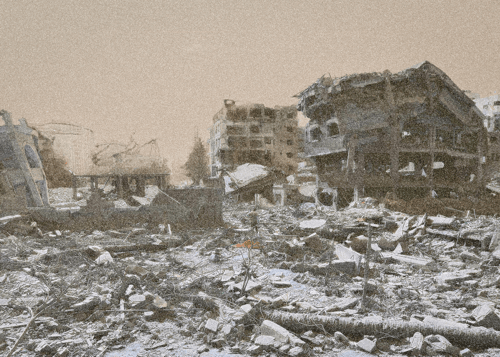
Germany, Europe’s leading arms exporter to Israel, on trial
Germany is on trial. The proceedings started last Monday, as Nicaragua brought Germany to the International Court of Justice in the Hague, alleging the European Union’s largest economy of “participation in the ongoing plausible genocide in the Gaza strip”.
Nicaragua seeks to prosecute possible violations of international humanitarian law. The Nicaraguan legal team cited the German cuts of funding for UNRWA (the United Nations Relief and Works Agency for Palestine Refugees in the Near East), as well as Germany’s substantial and continued export of arms to Israel as the main examples of Germany’s participation in “plausible genocide”.
Europe's very own United States
Just a month prior to the case, the European Commission announced that it would reinstate funding to UNRWA, and increase the overall humanitarian aid to Gaza to €150 million in the course of 2024. The EU’s increased commitment to humanitarian assistance pales in comparison with Germany’s arms deals with Israel.
After the United States, Germany is the second-biggest exporter of arms to Israel, making up 30% of all Israel’s arms imports. In 2023 alone, its government greenlit €326.5 million worth of exports with most of these permits being issued after 7 October 2023. Some of these weapons are now being used in Israel's war on Gaza.
Germany is also Europe’s biggest importer of Israeli arms, leading the pack with more than €135 million worth of imports between 2020 and 2023. In addition to these imports, Germany was also involved in Israel’s largest ever arms deal. Signed off last year, Germany bought Israel’s Arrow-3 defence system for €3.3 billion.
Three days prior to the ICJ case, the United Nations passed a resolution to “cease the sale, transfer and diversion of arms, munitions and other military equipment to Israel”. Both Germany and the United States rejected the proposal.
While the government is yet to publish its report on arms permits issued for the first quarter of 2024, it has told members of the German parliament and journalists that Germany reduced its export value to €9.3 million euros in 2024 so far.
A ”one-sided” trial
Germany is the only European country currently tried in court for possibly aiding and abetting genocide as the Palestinian death toll has reached over 34,094 (as of 12 April), 13,800 of those children. Israel's bombardment of the Gaza Strip has further become the deadliest conflict for journalists in the 21st century and the deadliest conflict ever for aid workers. Belgium, Italy, Spain and the Netherlands have already suspended the export of all arms and arms components.
The first day of the ICJ trial saw Nicaragua accusing Germany of being unable “to differentiate between self-defence and genocide.” Nicaragua’s allegations focused on the humanitarian toll taken on Gaza, while also urging that Germany reinstates its UNRWA funding.
Germany responded by claiming that the arms sales were mischaracterised. According to a lawyer of Germany’s legal team, most arms exports were for defensive purposes, describing Israel’s war on Gaza as an act of self-defence. They further rejected that the ongoing conflict is a genocide, given that the ICJ has not yet ruled definitively whether Israel has breached the Genocide Convention.
Domestically, Germany’s hardline stance has led to the repression of political protest. Around 600 civil servants who urged Germany to halt its arms exports to Israel described living in “a climate of fear”, as their freedom of speech is constrained by the risk of losing employment or looming arrests. In addition to the ICJ case, human rights lawyers took legal action against the German Government last week, demanding a halt to any more export clearances for arms to Israel.
Germany’s Foreign Minister Annalena Baerbock urged European unity and the importance of international law in bringing about peace in the conflict. Needless to say that Germany’s unconditional ‘support-by-default’ for Israel not only makes a unified European stance impossible, but continues to aid the humanitarian disaster that has been unfolding since 7 October. While the German legal team called Nicaragua’s case “one-sided”, the same can be said about the actions of the country that they represent.